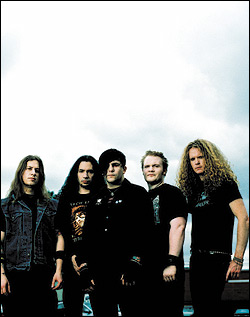PLENTY OF BANDS wear suit-and-tie ensembles onstage. Plenty of bands use their music to advance political ideals. Plenty of bands come from abroad to give the States a world of shit. And plenty of bands are influenced by the hand-clappin’ soul of decades-old rock ‘n’ roll.
(International) Noise Conspiracy
Graceland, Friday, April 27
I am only aware of one that does all four at once and shrink-wraps it in a see-through sheen of hot, electric sex. The (International) Noise Conspiracy are your huckleberry.
The Swedish five-piece defy and embrace convention. Their presentation evokes a million images of loose-hipped, loose-lipped punks who strutted a similar strut, but INC still sparkle with an originality of spirit. Their primary targets are capitalism and alienation, but their most recent LP, last year’s Survival Sickness (Epitaph), uses only suggestion as the scalpel.
So how does one know what to think? Relax. This is hardly an elitist, esoteric venture and will seem even less so after a few words of explanation. To better comprehend INC: 1) drink in Survival Sickness‘ punkish song titles (“Smash It Up,” “Enslavement Blues”); 2) turn over the case and scan the “alternate” titles (“Smash It Up” is more clearly defined as “The Creative Urge to Destroy Bourgeois Culture”); 3) consider the manifestos INC have substituted for lyrics in the disc’s booklet; and 4) spend an hour on the phone with their loquacious frontman, Dennis Lyxz鮬 formerly of Refused.
“We’re all into passionate music, garage and soul music, so what we wanted to do is take a political message and put it into the context of something that’s very familiar to people,” Lyxz鮠says. “The idea was to have music both my dad and my little brother can relate to, but from different perspectives; my dad being like, ‘Oh, yeah . . .’ because he used to listen to the Rolling Stones. My little brother listens to contemporary punk rock, so he can also understand it, and that’s sort of one of the initial plans, to fuse music that’s very . . . easy, maybe . . . to digest.”
Lyxz鮧s plan is to subvert the expectations of a jaded mass audience. He often sings about struggling to find commonality with strangers, in the hypothetical vehicles of a simple conversation (“I Wanna Know About U”), insubordination (“Smash It Up”), or sex (“Only Lovers Left Alive”).
“I live in a house in a small town, and I never talk to my neighbors, and I’ve lived here for two years,” he laments. “I’d like to live in a place where my neighbors just came over and watched a movie with me or had dinner without being invited. I just want that collectivistic idea of caring about other people to be expanded.”
If the slightest hint of organized altruism emerged in America, INC’s goal of exploiting capitalism’s weaknesses would be that much easier.
“A lot of people gave Refused a lot of shit when I was [in the U.S.] in ’96” Lyxz鮠says. “People were saying we were a bunch of pinko faggots, that the problem isn’t with capitalism, it’s with people being greedy, and silly stuff like that.
“The ’60s and ’70s were times of talking about resistance against a whole culture. In the ’80s, all that changed to personal politics: animal rights, feminism, gay rights . . . all good stuff. But a lot of those people sort of got lost in identity politics and stopped talking about the big system. Now I see a big shift because capitalism’s up on the agenda, and people are taking it as something we should fight against.”
I can tell Lyxz鮠is smiling, confident that the pendulum is swinging back in his favor.
“Now people raise their fists to us, and they’re like ‘Yeah!’ Some people point their fingers to us and tell us to piss off, but that’s sort of a given.”
HE’S EXCITED TO RETURN to Seattle, excited to discuss the N30 debacle(s), excited about an anti-globalization demonstration in Glastonbury this summer that could draw 20,000 demonstrators.
We debate the potential for violence to dilute a political message (“It’s very easy to focus on the broken Starbucks windows,” he begins, then—unable to resist—adds, “which I think is great“). This leads to a discussion of the “Smash It Up” CD booklet manifesto. Peppered with cheeky suggestions like “Falsify invitations to art exhibitions and pass them out to homeless people,” it’s reminiscent of Fight Club‘s subversive politicking.
“Yeah, a lot of people told us that. It’s amazing to see a movie like Fight Club that really moves you,” he says. “Then there’s this movie Men of Honor, and I’m just like ‘How many movies can we make about American Marines saluting each other with a tear in their eye and the American flag hanging behind them?!’ Oh my god!”
It’s a given that art should ideally entertain and inform. INC strive to do both, but Lyxz鮠knows the limitations of the stage as a pulpit.
“A lot of people ask ‘What if people just come to your shows to dance and have a good time?'” he continues, in a put-on snotty tone. “And I’m like, ‘I think that’s beautiful,’ you know? I don’t expect everybody to go home and start reading French post-structuralism. I don’t. But we have our ambitions.
“We want people to leave the show strutting away in a dance with a smile on their face, a political pamphlet in their hands, and a clenched fist.”







